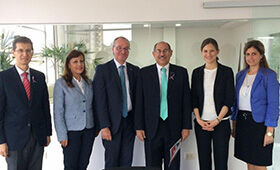Dual education and training in Paraguay is a key political priority
There is great political support in Paraguay for the introduction of dual education and training based on the German model (MoPaDual). This is furthering the creation of the general institutional framework. BIBB and Paraguayan vocational education and training stakeholders have successfully developed foundations for MoPaDual.

High political priority is accorded to the introduction of dual education and training in Paraguay. In the view of the German ambassador in Paraguay, the President of Paraguay, Horacio Manuel Cartes, attaches great importance to the project.
According to Guillermo Sosa Flores, Paraguay's Minister for Employment, dual education and training could be available in future in agriculture, the metal processing industry, the construction industry and energy supply.
In a similar way to dual vocational education and training in Germany, Paraguay is also seeking to involve relevant national VET stakeholders in the management and supervision of MoPaDual.
The aim is to achieve a joint understanding regarding objectives, roles and mandates. The collaboration of state and business in the Paraguayan form of dual education and training is also expected to play a key role.
MoPaDual gathers momentum – 11 action areas
At the start of May 2017, the BIBB worked together with Sistema Nacional de Formación y Capacitación (SINAFOCAL) and Servicio Nacional de Promoción Profesional (SNPP) - both key stakeholders in Paraguayan vocational education and training - to create the institutional foundations for the introduction of a Paraguayan form of dual education and training.
11 actions areas - the foundations of MoPaDual - were defined. These are control, financing, target group, standards, training personnel, examinations, rights and obligations of trainees, research, improved image of vocational education and training, advising companies and trainees, and careers guidance.
Need for clarification still exists with regard to the target group for MoPaDual: 15 to 18 year olds (secondary level 2) or adults (the post-secondary level or tertiary sector).
The issue regarding employment of those who have completed dual education and training in public service following the training remains unresolved. Up to now graduates who have completed training in the public service may not be employed immediately. They must go through an application process. This is time-consuming and entails uncertainties for graduates.
The signing of a cooperation agreement between BIBB and the Paraguayan Minister for employment in December 2016 marked the launch of MoPaDual, a third-party funded project. The project will run for a period of two years. The BIBB is providing advice in two main areas:
- the setting up of institutional and structural foundations for the implementation of a dual education and training system including organisational development and
- the development of company-based standards.